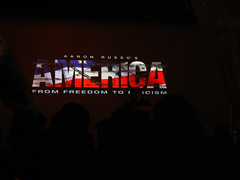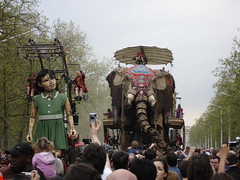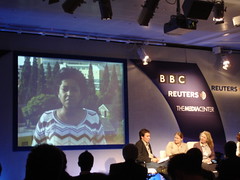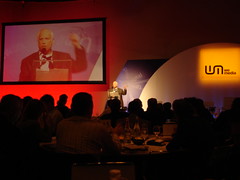May 29, 2006
America at Cannes

America at Cannes
Originally uploaded by .M..
One of the surprises of this year's Cannes Film Festival. Aaron Russo's America: From freedom to fascism won't win any prizes for its aesthetic but its message packs a punch, especially if you need a reminder about modern day totalitarian regimes. The film was premiered after a short speech by Russo down on the Cannes beach after official venues blanched at the political implications. I've read quite a few negative reviews of the film but none question the veracity of the content - ranging from US income tax 'law' to the threat that RFID tags pose to civil liberties. Less entertaining than a Michael Moore flic but this one comes across more honest. It will be interesting to see what traditional distribution this gets. I spoke to Aaron after the premiere and encouraged him to consider a Creative Commons release in the future like that done for Outfoxed.
.
http://www.freedomtofascism.com
May 10, 2006
COPE Telecom Bill
Crony capitalism is hard at work in the US. A new bill, the Communications Opportunity, Promotion and Enhancement Act of 2006, is threatening to remove the current requirement for phone and cable companies to adhere to policy safeguards and non-discriminatory access. It also aims to cut back resources and access to public access cable channels including those for education and government information.
Democracy Now! | COPE Telecom Bill Affects Net Neutrality, Local Cable Franchises and Funding for Public Access
May 09, 2006
The Book of Cool wins Webbys
Big congrats to my good friend Aladin and Ocelot Productions. Their project The Book of Cool has scooped THREE People's Voice awards at The 2006 Webby Awards.
BEST USE OF VIDEO OR MOVING IMAGE - PEOPLE'S VOICE WINNER
BEST NAVIGATION/STRUCTURE - PEOPLE'S VOICE WINNER
RETAIL - PEOPLE'S VOICE WINNER
Onya!
May 08, 2006
The Sultan's Elephant
The largest street theatre piece ever performed in London, The Sultan's Elephant was a gorgeous display of puppetry, street magic and installation art that played out over four days. Thousands crowded The Mall and other inner-London streets to experience it up close. The elephant sprayed water from its trunk for those closest. We all fell in love with French street theatre in an instant.
May 05, 2006
We Media Global Forum - Day Two
The forum continued at Reuters HQ in Canary Wharf. Even bigger signage, more food, and a much more measured debate started to unfold. It seems that the blogging "fringe" were not the only ones dissatisfied with much of the previous day but with a smaller group and a smaller venue the talks took on a more interesting dimension. Instead of quiet mutterings we witnessed expressions of outrage from the stage. Wilfred Kiboro from the Nairobi-based Nation Media Group objected to Reuters Africana photography and constant patronising commments about Africa being in the stone age. Rachel Rawlins from the Global Voices network called Yahoo! to task for what she felt was an inconsistent ethical line, funding a "Do Good" division (sounding very Zoolander) while assisting Chinese authorities to jail dissidents using their web services.
From my part, I was glad to have seen the event through. I was so tempted yesterday to blow it off, especially after attending the 'Fringe' event (with talks from Microsoft and the BBC). There was a far more balanced world view considered on Day Two. Starting with China, then South East Asia, the Middle East and then Africa, the sea of white men subsided a little to reveal new perspectives. Live satellite link-ups forced the organisers to keep things ticking along like clockwork but the overall impression was of an impressive logistical exercise. I spent more time researching the details of the delegates and increasingly impressed that many had bothered to come at all. Perhaps what was being said in the structured sessions was largely irrelevent. Maybe the forum was never going to be a place for honest frank debate but purely the rub up against different backgrounds was enough. I started to see what the whole point was. I'm still not sure "We Media" is a fair label for the Media Centre's agenda but as frustratingly pedestrian as some of the talks were, it was clear enough (from reading blog comments and casual questioning) that people were learning. What they were learning seemed to be lessons and experience that is now years-old but still invaluable. It is so easy to become out-of-touch with other people's perspectives. There is never a better time to realise the scale of what is taking place. For indies like me, the Forum was a useful reality check. We have a long way to go before the concepts ingrained in new media are disseminated.
On that note I felt slightly (but only slightly) bad about trashing the Digital Assassins session the previous day. Fair enough... not everyone has been exposed to PSP, Myth TV, RSS and the million other technological innovations of the last few years. As more and more speakers took time to acknowledge, there really wasn't very much to say from the all the podiums and panels that was genuinely new. This is simple an opportunity for cross-fertilising and sharing experiences. The real forum took place un-facilitated between constant circling attendees listening out of and gradually narrowing in on voices they felt some connection to. What more can you expect? The biggest laugh of the day came with a short cheeky video entitled "Night of the Long Tail". The C word (conversation) may just continue.
May 04, 2006
We Media Global Forum - Day One
Today was the first day of the We Media Global Forum held in BBC Television Centre. I'd been looking forward to this for some time as a rare opportunity to converse with people serious about the ramifications of social media and interested in the many manifestations of its current form. For several weeks, the organisers had been hosting a blog with lofty aspirations and lots of considered opinions from around the globe. I felt privileged to attend..
However I came away today feeling that the whole shebang, after a great lead-up, is somewhat of a let-down - a missed opportunity for frank discussion.
Topics ranged from blogging 101 through to circular debates about how mainstream media deals with "trust", "citizen journalism" and "conversations". The event was carefully stage-managed, even to the extend of introducing increasingly annoying "advert" breaks in-between sessions. Do Microsoft and BT really need more publicity? We certainly never had a moment to forget who the forum sponsors were either (BBC and Reuters). It all seemed terribly slick, sanitised and a bit too repetitive for its own good. I've never tired of hearing the word "conversation" spoken before. There were aspirational buzzwords aplenty and complex issues for consideration but the subtext seemed simple enough - big mainstream media players have really got nothing to contribute to the social debate - their function is simply to co-opt and leverage each form of social transaction that has been proven to work elsewhere. That's not enough meat to drive a FORUM. That is ultimately what I took home. Social media is serious media business nowadays and constant references to "the leaders" kept reminding everyone of how much the traditional rule of hierarchy still applies.
It has been years since I attended a Reuters-sponsored event. It's been even longer since I worked for the company (receiving my web production assignments on floppy disk). I could have sworn that the last time I heard senior Reuters staff discuss open content newsfeeds, it was to poo-poo the suggestion that anyone would possibly bother doing their own (RSS) aggregation when Reuters and Bloomberg provided tailor-made proprietary services. How the worm has turned. Or has it? Mark Thompson, Director-General of the BBC, suggested that changes that are afoot are going to happen with or without the efforts of media corporations. I agree but much time was spent debating the role of mainstream media in relation to the "blogsphere". The framework for debate seemed seriously flawed. The underlying tools of production and publication are now one and the same. A few more developers in the room may have made that point more clearly more quickly.
Ironically, the two sessions that were the most impactful (both good and bad) were from the BBC. On home ground, a rather embarassing session on "digital assassins" brought home the cultural gaps faced by new media practitioners. The intent was admirable, to bring diverse groups together for a quick chat about new digital stuff, but the execution was lousy. Far more successfully, a special edition of the BBC Radio show World Have Your Say, was produced and broadcast, live, from around the delegates. Callers came in from around the globe.
I feel somewhat sorry for the indie folk and small businesses who have invested heavily in attending. No history in the making so far. I hope tomorrow makes up for it in some small way. Not one person I spoke to appeared to be getting any great inspiration or insight. I risk sounding totally disengenious (having received a complementary "fellowship" to attend) but the worst thing that can be said about a gathering of this sort is that you come away without learning anything. All I learnt was how tough a crowd this was for our "celebrity activist". As the highest profile speaker, Richard Dreyfuss gave what I thought was a surprisingly thoughtful and measured talk. This does not appear to be a view shared by many. His comments appeared to bounce of many of the media folk around me who fairy-clapped him on and off-stage. However warnings about the potential damage WE could do through our increasingly instantaneous media rang true. His was also one of the few voices to convey any real passion and conviction. I bought it.
I'm not going to write Dreyfuss off as an actor seeking the limelight past his prime (unlike several kind hearted bloggers) and I'm not going to write off the We Media Global Forum. I think they both have a certain credibility in this space. But I am growing suspicious about the relevence of this forum to people working outside the MEDIA. It's a shame but perhaps inevitable that the Forum is failing to live up to its own hype. Today wasn't special. I'll be back tomorrow to listen some more and stick my oar in once again. It's the least us "fellows" can do for a free lunch.


